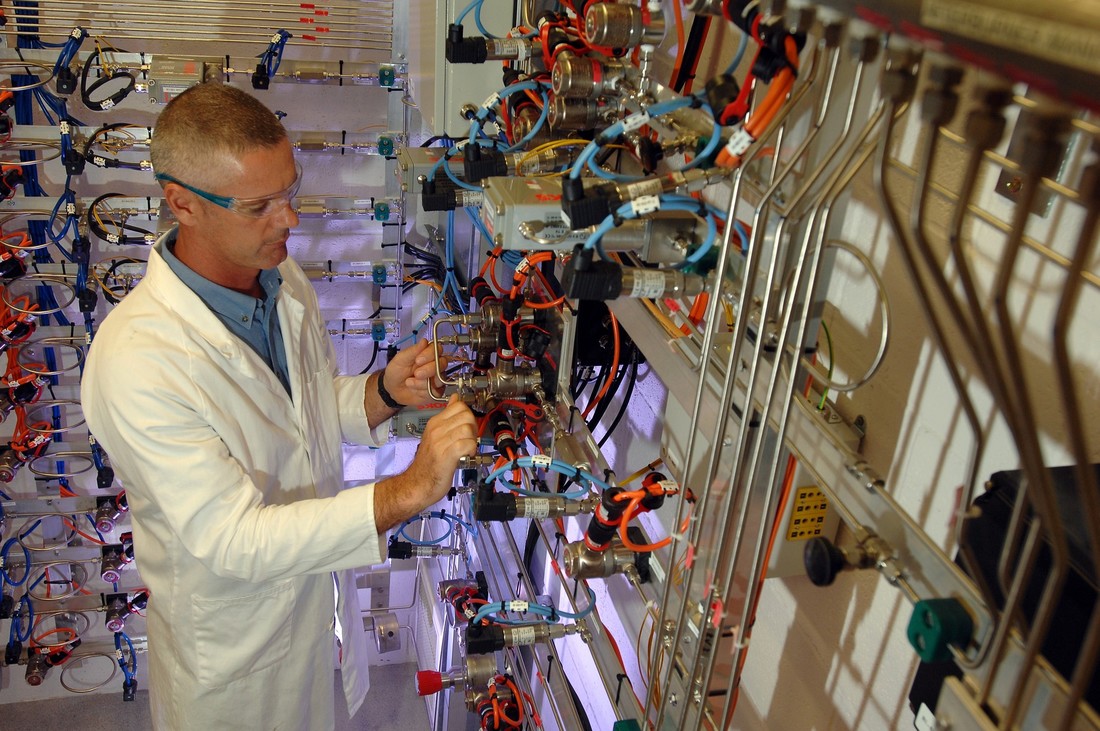Overview
Hydrogen plays a central role in our drive towards a sustainable and decarbonised future and will eventually become a tradeable commodity, like oil is today. However, efficient and cost-effective storage, as well as transportation remains a barrier for the commercial use of hydrogen as a renewable energy solution.

Beyond H2 develops sustainable and cost-competitive hydrogen solutions using renewable energy, such as waste biogas (mixture of gases from waste sources, such as manure and sewage). They are also a foundation member of the Clayton Hydrogen Technology Cluster, an industry network partnering with CSIRO's Hydrogen Industry Mission to accelerate the development of Australia's hydrogen industry.
The challenge
To break the barrier of hydrogen storage and transport, carriers are needed, and methane (CH4) is considered one of the promising hydrogen energy carriers. CH4 can be created by reacting hydrogen (H2) and carbon dioxide (CO2) via a process called methanation. However, this reaction requires a large amount of energy (heat), therefore, catalysts are often used to accelerate the reaction, creating a more energy-efficient process.
Our solution
Beyond H2, through the CSIRO Kick-Start program, assessed whether a low-temperature reaction between CO2 and H2 could be developed to reduce the energy required for methanation and lower the production cost by testing different types of catalysts. This project is led by Senior Research Scientist, Dr Yunxia Yang, who is highly experienced in catalyst development with a focus in hydrogen utilisation.
Outcome
The company were able to identify a new catalyst in this Kick-Start project that could convert CO2 and H2 to CH4 at 90 per cent conversion and 100 per cent selectivity (the ability of a catalyst to direct a reaction to yield a particular product) at much milder conditions (temperature less than 300 °C and ambient pressure). This formulation demonstrated a 30 per cent energy cost saving, improving the energy efficiency of Beyond H2’s process. After concluding the initial Kick-Start project, Beyond H2 continued to work with CSIRO to optimise and shift the focus of the process towards biogas through a second Kick-Start project. As part of this, they successfully developed a proof-of-concept of biogas conversion to CH4. The outcomes from these Kick-Start projects are expected to contribute to the test and demonstration of a pilot-scale methanation reactor to produce renewable carbon negative CH4 as a carrier molecule for H2.
Thanks to the support of CSIRO’s Kick-Start program, we were able to work with world-class researchers to commercialise innovation in advancing the promise of technology. It also helps us find a commercial pathway to fully unleash the great potential of renewable hydrogen in near future.
— Stephen Wee, Beyond H2 director.
Overview
Hydrogen plays a central role in our drive towards a sustainable and decarbonised future and will eventually become a tradeable commodity, like oil is today. However, efficient and cost-effective storage, as well as transportation remains a barrier for the commercial use of hydrogen as a renewable energy solution.
Beyond H2 develops sustainable and cost-competitive hydrogen solutions using renewable energy, such as waste biogas (mixture of gases from waste sources, such as manure and sewage). They are also a foundation member of the Clayton Hydrogen Technology Cluster, an industry network partnering with CSIRO's Hydrogen Industry Mission to accelerate the development of Australia's hydrogen industry.
The challenge
To break the barrier of hydrogen storage and transport, carriers are needed, and methane (CH4) is considered one of the promising hydrogen energy carriers. CH4 can be created by reacting hydrogen (H2) and carbon dioxide (CO2) via a process called methanation. However, this reaction requires a large amount of energy (heat), therefore, catalysts are often used to accelerate the reaction, creating a more energy-efficient process.
Our solution
Beyond H2, through the CSIRO Kick-Start program, assessed whether a low-temperature reaction between CO2 and H2 could be developed to reduce the energy required for methanation and lower the production cost by testing different types of catalysts. This project is led by Senior Research Scientist, Dr Yunxia Yang, who is highly experienced in catalyst development with a focus in hydrogen utilisation.
Outcome
The company were able to identify a new catalyst in this Kick-Start project that could convert CO2 and H2 to CH4 at 90 per cent conversion and 100 per cent selectivity (the ability of a catalyst to direct a reaction to yield a particular product) at much milder conditions (temperature less than 300 °C and ambient pressure). This formulation demonstrated a 30 per cent energy cost saving, improving the energy efficiency of Beyond H2’s process. After concluding the initial Kick-Start project, Beyond H2 continued to work with CSIRO to optimise and shift the focus of the process towards biogas through a second Kick-Start project. As part of this, they successfully developed a proof-of-concept of biogas conversion to CH4. The outcomes from these Kick-Start projects are expected to contribute to the test and demonstration of a pilot-scale methanation reactor to produce renewable carbon negative CH4 as a carrier molecule for H2.
Thanks to the support of CSIRO’s Kick-Start program, we were able to work with world-class researchers to commercialise innovation in advancing the promise of technology. It also helps us find a commercial pathway to fully unleash the great potential of renewable hydrogen in near future.
— Stephen Wee, Beyond H2 director.
